Overall Vista Performance: XP vs. Vista vs. Vista x64
Benchmarking in Vista is an extremely difficult task, thanks to features like SuperFetch designed to improve performance at the sacrifice of repeatability. We're in love with SuperFetch as a feature, but it does make our jobs a bit more difficult as we have to be very mindful of what has been cached into main memory and how that impacts the performance of our benchmarks. Testing difficulties under Vista are compounded by the fact that our major test suites don't work under the new OS. SYSMark and PC WorldBench simply won't run and thus we have to rely on individual application tests and home-brew scripts to measure performance.
Our goal for this article was to find out if Windows Vista, on modern day hardware, continues to be slower than Windows XP as it has been in previous beta and RC versions. The secondary goal is to look at x64 performance to see if it too has changed behavior, to the point where you no longer need to worry about losing 32-bit performance if you move to the 64-bit version of Vista. We ran a handful of application tests to compare the three OSes (XP, Vista and Vista x64), and later on we'll focus on gaming tests as well to showcase graphics performance.
PCMark '05 Performance
Despite looking quite synthetic, PCMark has grown into a nice lightweight alternative to the big application suite benchmarks like SYSMark. It was also one of the first benchmarks to get official Vista support, although it remains a 32-bit only test.
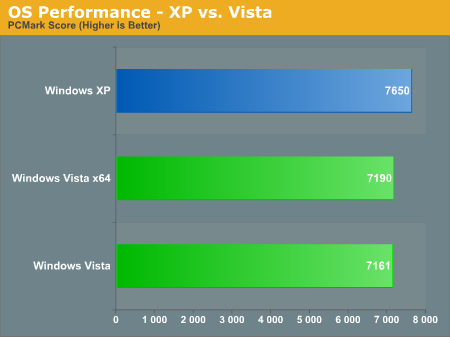
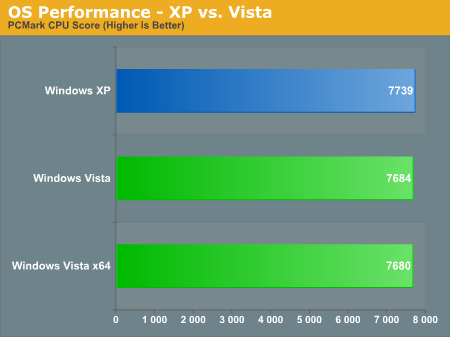
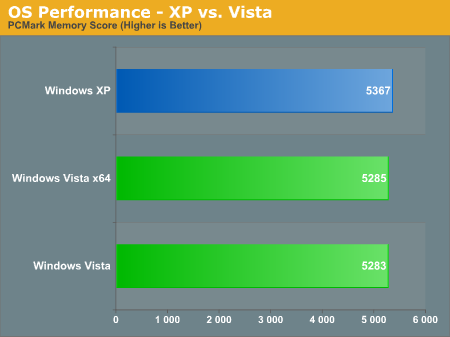
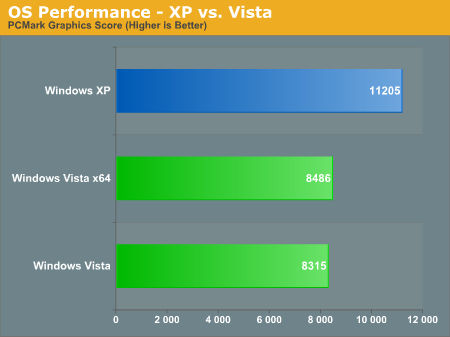
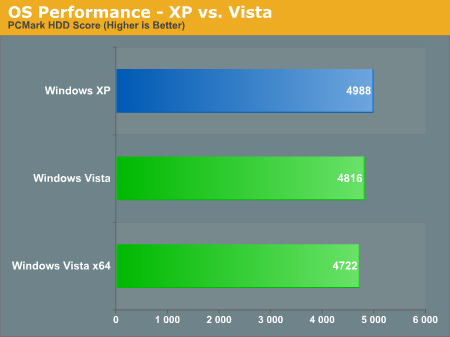
Performance under PCMark is fairly close between Vista and XP, with XP generally holding on to a 1% - 4% performance advantage in most of the categories. The only exception to the rule is the graphics score of PCMark which has XP at around 35% ahead of Vista, but we'll address graphics performance shortcomings of Vista later in the article.
The difference between the 32-bit and 64-bit versions of Vista are hardly pronounced, with the two being evenly matched across the board. Once again, remember that PCMark is a 32-bit benchmark so it is running in Windows on Windows (WOW64) mode. That it can remain competitive is good news, but whether that's because WOW64 works well in all cases or it is merely optimized for PCMark05 remains to be seen.
3DMark '06 Performance
We chose to include 3DMark '06 performance here instead of with our game tests to look at the gaming performance of Vista on a system level rather than a GPU level:
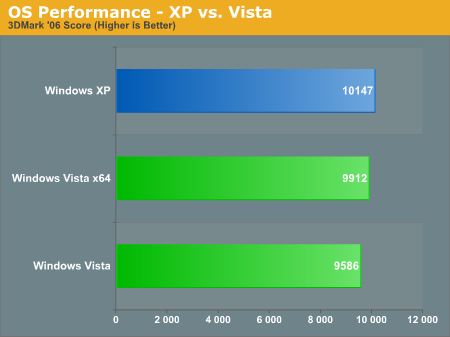
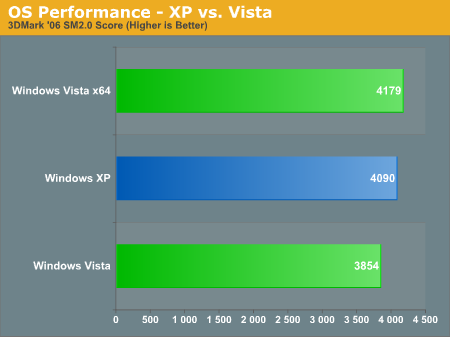
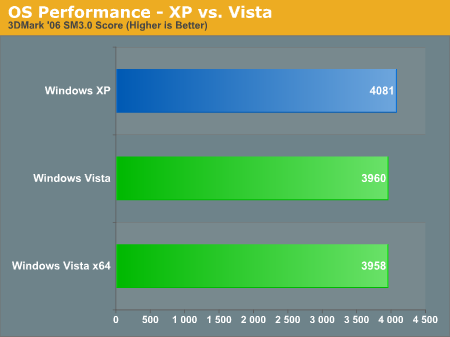
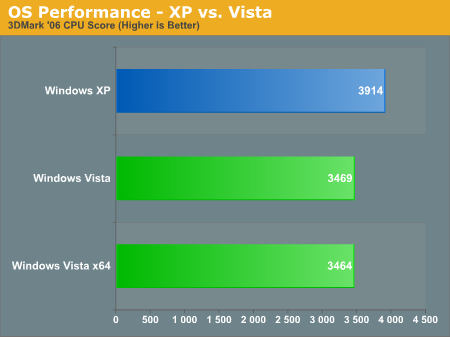
Overall XP is about 6% faster than Vista, although the 3DMark06 CPU score is nearly 13% higher on XP than it is on Vista. As a 32-bit benchmark, it's once again good to see no negative performance difference between the Vista x86 and x64 versions.
Benchmarking in Vista is an extremely difficult task, thanks to features like SuperFetch designed to improve performance at the sacrifice of repeatability. We're in love with SuperFetch as a feature, but it does make our jobs a bit more difficult as we have to be very mindful of what has been cached into main memory and how that impacts the performance of our benchmarks. Testing difficulties under Vista are compounded by the fact that our major test suites don't work under the new OS. SYSMark and PC WorldBench simply won't run and thus we have to rely on individual application tests and home-brew scripts to measure performance.
Our goal for this article was to find out if Windows Vista, on modern day hardware, continues to be slower than Windows XP as it has been in previous beta and RC versions. The secondary goal is to look at x64 performance to see if it too has changed behavior, to the point where you no longer need to worry about losing 32-bit performance if you move to the 64-bit version of Vista. We ran a handful of application tests to compare the three OSes (XP, Vista and Vista x64), and later on we'll focus on gaming tests as well to showcase graphics performance.
PCMark '05 Performance
Despite looking quite synthetic, PCMark has grown into a nice lightweight alternative to the big application suite benchmarks like SYSMark. It was also one of the first benchmarks to get official Vista support, although it remains a 32-bit only test.





Performance under PCMark is fairly close between Vista and XP, with XP generally holding on to a 1% - 4% performance advantage in most of the categories. The only exception to the rule is the graphics score of PCMark which has XP at around 35% ahead of Vista, but we'll address graphics performance shortcomings of Vista later in the article.
The difference between the 32-bit and 64-bit versions of Vista are hardly pronounced, with the two being evenly matched across the board. Once again, remember that PCMark is a 32-bit benchmark so it is running in Windows on Windows (WOW64) mode. That it can remain competitive is good news, but whether that's because WOW64 works well in all cases or it is merely optimized for PCMark05 remains to be seen.
3DMark '06 Performance
We chose to include 3DMark '06 performance here instead of with our game tests to look at the gaming performance of Vista on a system level rather than a GPU level:




Overall XP is about 6% faster than Vista, although the 3DMark06 CPU score is nearly 13% higher on XP than it is on Vista. As a 32-bit benchmark, it's once again good to see no negative performance difference between the Vista x86 and x64 versions.










105 Comments
View All Comments
nishzone - Saturday, May 24, 2008 - link
Hi,I'm glad tnat your memory usage is similar to mine and therefore I might finally understand this. You have 2 gig of Ram...I understand that superfetch is the reason free ram is 0 (cache increases as free memory decreases). But why is the memory usage 45%? so around 1 gig?
I also have 50% usage on startup. Is vista using 1 gig memory? There is something I don't understand here because you recommended 1 gig for general users.
Regards,
Nishzone
Dataland - Wednesday, November 28, 2007 - link
I think Microsoft needs a performance reset. As I've said in some previous posts, I think software in general, and Microsoft software in particular, is getting slower at faster rate than hardware is getting faster. And this problem acutely affects Vista. I think Microsoft needs... (Pingback)Performance Reset
http://dataland.wordpress.com/2007/11/28/performan...">http://dataland.wordpress.com/2007/11/28/performan...
Kondado - Saturday, February 10, 2007 - link
I've done my own tests. I sent the same amount of data (51 files, 2,5 GB) once from XP to Samba, then from Vista to Samba (OpenBSD). Then I did the same from XP to XP, and from Vista to XP. XP was always a LOT faster.I would really know if it's the drivers or the stack...
jonp - Monday, February 5, 2007 - link
It seems like the budget system area was a little overlooked in this review of Vista. So I have some questions:"Memory in Vista..." - It appears that acceptable multitasking performance is found somewhere in the 3GB to 4GB memory size area. Many budget systems have only two memory slots and many new ones support dual memory access. This will force budget systems to 4GB which is fairly pricey now and probably will be for some time.
"CPU Performance..." - Your love for anything Core2 Duo shines here. But what about the dual core Pentium Ds? Like the D915 2.8GHz processor. Yes it is Netburst, but also easier on the budget than a Core 2 Duo processor. We need something more specific here in terms of benchmarks/guidelines.
Video adapters - I didn't see anything that talked about integrated video adapters vs. VGA/PCIe video adapters. Are any of the integrated graphic engines, like Intel 950GMA provide acceptable performance for VISTA? How about older video cards? Minimum graphics memory? Graphics engine speed? Again we need more specific guidance here.
Hard drive - You addressed hard drive performance, in a way, in the "Vista Search for Fast Drives Only" section. But again no specific device selection guidelines like: RPM, cache size, average access, size, data transfer rate, ...
Virtualization - It appears that MS forbids the use of virtualization products with Vista Home Basic and Home Premium editions forcing budget users to more costly editions of Vista.
Upgrade or "clean" install? - Not strictly a budget system issue; the web if full of warnings about NOT trying to upgrade to Vista --- that it should only be a "clean" install situation. That upgrading is fraught with too many pitfalls that it isn't even worth trying. And not all editions of Vista are allowed to do in-place upgrades of the XP editions; oh, and you can't do an in-place upgrade of anything prior to XP. See http://tinyurl.com/36ljxv">http://tinyurl.com/36ljxv for some upgrade details.
JarredWalton - Monday, February 5, 2007 - link
Basically, a lot of that falls into areas we are going to look at in future articles. Given that we don't really recommend most people upgrade to Vista yet, the lower-end your system is the less we would consider Vista. Pretty much all of the DX9 NVIDIA and AMD cards do fine with the Vista Aero Glass UI, but IGP solutions are slower. Individual tolerance for the UI will vary; I'm sure plenty will be okay with GMA950 and Glass, while others won't want anything less than a $100 discrete GPU. Oh, and GPU drivers for Vista are still flaky, IMO. :)
HDD, anything 7200 RPM should be fine. CPU, really with a decent GPU the requirements aren't all that much higher than XP. RAM is more important - don't even think about Vista with less than 1GB - but HDD and CPU most people with anything made in the past two years will be fine. Just my opinion there - individual usage and preferences will again play a role.
I wouldn't say 3-4GB of RAM is even remotely necessary for most people. A few will like it, but 2GB is still sufficient for about 99% of people.
Virtualization and Upgrades... I'll have to defer to others there. Again, I recommend discretion, so I would tend towards doing a full backup (Ghost or similar) of any system before doing a Vista upgrade. I believe Gary is about to revert his system for the time being, as Vista has just had a few too many glitches. The number of people that worry about virtualization - really intending to use it, not just for test purposes - is again very small. I think mostly we're seeing the vocal minority complaining. Still, I find it odd that MS even worries about whether or not people run the OS via virtualization - unless the glitches are aggravated by such an environment, which is entirely possible.
jonp - Tuesday, February 6, 2007 - link
Thanks Jarred...you insights are always very helpful and I am glad that these topics will get more focus in the future. Jonjonp - Monday, February 5, 2007 - link
Both of the charts in the Compound TCP section for Windows Vista say "Compact" and not "Compound".duploxxx - Sunday, February 4, 2007 - link
Its probably me that's missing a page or so but could you guys explain what system you used for these tests?funk3y - Saturday, February 3, 2007 - link
HelloI also spent some time testing the network part of windows vista, and I discovered some quite interesting things:
Windows Vista is reducing the network I/O when an application using the audio interface is launched, I discovered this when copying large files over my network.
When I copy large file through the network the average speed is 40 mb/sec and the taskmanager whow 30-50% of network use, as soon as I start an application playing sound (WMP, Skype, Warcraft III, ....) the rate drop to 8 mb/sec and the network use in the taskmanager never go beyond 12.5%
I achieved those test on different hardware, with differents drivers and the results are always the same; it is just impossible to get further then 12.5% of network use while playing a sound.
My guesses are that microsoft voluntary did this, in order to avoid sound crackling. Because of the new driver scheme, bad written drivers having to do many I/O could lead to sound degradation (I had this issue while using my raptors RAID on a NF4 board; making a lot of I/O on the disk just killed the sound quality).
As you where streaming a film while benchmarking, you may have been in this situation. It could be nice if you could rerun some benchmark taking into account all what I have written.
As I am already posting, here are some other consideration about DOS and vista:
-It is just impossible to launch a DOS application in fullscreen mode! This functionnality lack can be really painfull in environnement where DOS application are still well used; I just don't understand microsoft's choice
-I don't think that vista x64 is still able to launch 16 bit apps anymore (keep this in mind before upgrading to x64!)
ministerchief - Saturday, February 3, 2007 - link
I have a "Corsair Flash Voyager 4Gb" usb stick and I can't use it to "BOOST" my system.So, how anandtech could use it ?
Can someone tell me how to use this flash drive with the "READY BOOST" feature.
THX